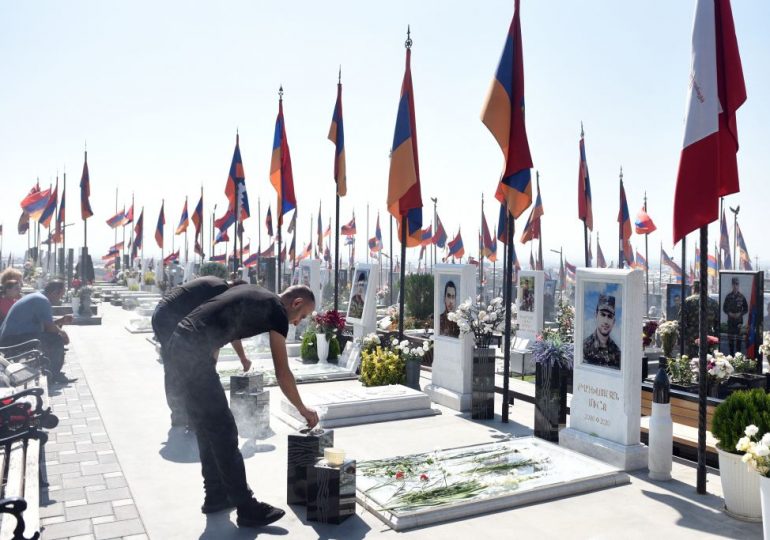“History has taught us that when terrorists and dictators don’t pay a price, they cause more death and destruction,” President Joe Biden said on Oct. 20, explaining Washington’s backing of Israel and Ukraine.
Exactly a month before those remarks, an oil-rich dictatorship conducted a foreseeable and preventable operation against a disputed democratic region, committing atrocities—including against women and children—and prompting the entire population’s exodus. But the Biden administration is yet to hold last month’s aggressor, Azerbaijan, accountable for the onslaught and ethnic cleansing of Nagorno-Karabakh.
[time-brightcove not-tgx=”true”]
More than 100,000 indigenous Armenians in Nagorno-Karabakh endured Azerbaijan’s medieval starvation siege for over nine months. On Sep. 19, as they waited in long bread lines, starving Armenians heard the sound of bombs. For 24 hours straight, Azerbaijan shellded Nagorno-Karabakh with Israeli- and Turkish-made weaponry until the Armenian population capitulated to stop the slaughter. Within days, every surviving family left behind their homes and lives—and an ancestral culture of two and a half millennia—fleeing through the very corridor that Azerbaijan had sealed for a final, one-way exit.
Read More: What Cultural Genocide Looks Like for Armenians in Nagorno-Karabakh
Now, with the world’s eyes on Gaza, experts believe that sovereign Armenia is the next Turkish-Azerbaijani target—and the U.S. is aware of these developments.
The most evident signs of an impending invasion are the joint Turkish-Azerbaijani military exercises taking place on October 23-25 in Nagorno-Karabakh, to Armenia’s east, and Nakhichevan, another formerly Armenian-populated region to Armenia’s west, with the conspicuous arrival of Turkish F-16 fighter jets in Azerbaijan. Last time such a massive exercise took place, in 2020, it preceded the 44-day war against Armenia-backed Nagorno-Karabakh, preparing ground for last month’s “final solution.”
Another sign of an impending invasion is the reported appearance of “!” on Azerbaijan’s military trucks headed toward Armenia. The symbol roughly resembles a severed Armenia and ostensibly serves as the conclusion of the 2020-2023 “Karabakh is Azerbaijan!” war slogan.
Despite celebrating Armenia as a democracy, the U.S. has been cautious to reprimand its petro-aggressor. Even after last month’s ethnic cleansing in Nagorno-Karabakh, the Biden administration has merely extended the non-renewal of a statutory sanction on Azerbaijan, rather than imposing targeted financial sanctions. The coming weeks may prove to be the next test.
Armenia is the lowest hanging fruit for Turkey’s leader, President Recep Tayyip Erdoğan, who is desperate for a show of power. Oct. 29 marks an important milestone for the country—the 100th anniversary of the establishment of the Turkish Republic—with no significant planned celebrations. Erdoğan, who recently extended his two-decade rule, is desperate to make the jubilee all about himself: out of nine official posters celebrating the centennial, the Republic’s founder, Mustafa Kemal Atatürk, is only depicted once. It’s of no surprise—Erdoğan has been determined to go down in history as a bigger figure than the revered Atatürk, but he has not delivered on such grandiose promises. A successful invasion of Armenia would realize the Armenian Genocide-era goal of connecting Azerbaijan and Turkey continuously—something that even Atatürk couldn’t accomplish.
Read More: What Erdoğan’s Victory Means for Turkey—and the World
Despite Russia being Armenia’s ally on paper, President Vladimir Putin stands to gain from an invasion as well. Putin has made it clear that the democratically-elected Armenian government must be punished for its pro-Western flings, including the recent move to finalize its International Criminal Court membership; just last week, a top Russian official referred to Armenia as the next Ukraine. But it’s more business than personal: the envisioned Turkish-Azerbaijan land-link at the expense of a splintered Armenia would be patrolled by Russia, thereby offering the latter enormous economic and geopolitical leverage. And finally, teaching Armenia a lesson in loyalty can give Putin instant gratification amid his failing operation in Ukraine.
As the Nagorno-Karabakh refugees fled last month, foreign media and Western delegations came to southern Armenia. Among them was Yuri Kim, a top U.S. official who five days prior to Azerbaijan’s attack warned that the U.S. would not tolerate it. When confronted with the empty threat, the official dodged the question.
The U.S. had the tools to prevent the ethnic cleansing of Nagorno-Karabakh. It has even more tools to prevent an invasion of democratic and sovereign Armenia. Just ask Joe Biden.
“While he brags about his deal-making skills at campaign rallies,” candidate Joe Biden chided his opponent in 2020, “Trump has yet to get involved personally to stop this war.” The reference was in regards to Azerbaijan’s 2020 war against Armenia-backed Nagorno-Karabakh which saw the former register partial victory, building the ground for what’s happening today.
Read More: The U.S. Keeps Failing Armenians in Nagorno-Karabakh
Tellingly, Azerbaijan’s 2020 attack was not only opportune—happening at the time of the U.S. election, let alone a global pandemic—but also coincided on the 100th anniversary of Turkey’s invasion of Armenia. Which is why the upcoming centennial of Turkish independence should not be discounted. Turkey is not subtle with its intention to mark the anniversary with violence. This week’s military exercises on both sides of Armenia have been named Mustafa Kemal Atatürk 2023, making it clear that the intended impact, at the bare minimum, is connecting history to last month’s ethnic cleansing in Nagorno-Karabakh in name.
That the U.S. is privately aware of but publicly downplaying the even gutsier scenario of an invasion of sovereign Armenia, not least because of a focus on support for Ukraine and Israel, points to one conclusion: history is teaching us that some democracies—like some lives—are worth more than others.
Leave a comment
















